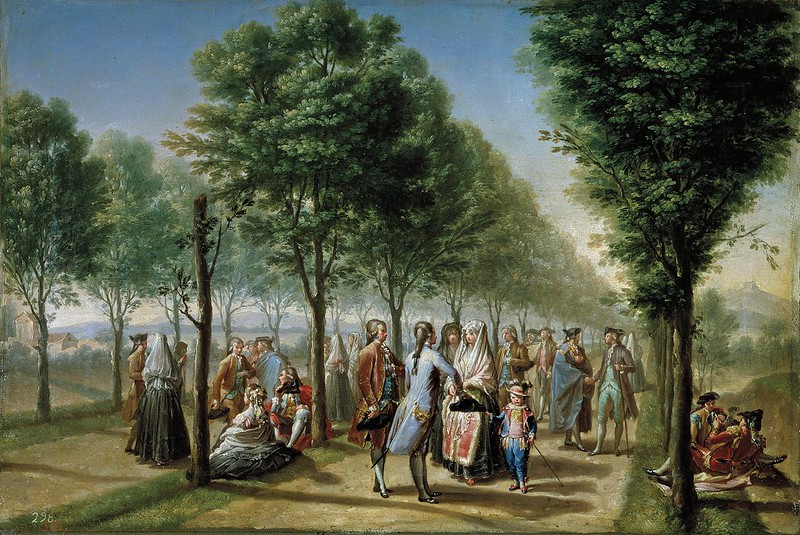Obra de Francisco Bayeu (1734-1795), pintor aragonès (1)
- Recordatori de János Fusz -
En el dia de la commemoració del seu 197è aniversari de decés
Parlem de Pintura...
Francisco Bayeu y Subías (Saragossa, 9 de març de 1734 - Madrid, 4 d'agost de 1795) va ser un pintor aragonès. Va iniciar la seva formació a Saragossa, dins de la tradició del barroc espanyol i del coneixement de la pintura italiana del segle XVIII. El 1763 va ser reclamat a Madrid per Anton Raphael Mengs, pintor de cambra de Carles III, per col·laborar en les decoracions palatines. La influència d'aquest artista va ser molt important en la seva obra posterior, en què les normes acadèmiques, la precisió del dibuix i les estudiades composicions van prevaldre per damunt del sentit escenogràfic i la riquesa cromàtica amb què havia caracteritzat la seva producció anterior. Entre els seus treballs més importants van destacar els frescs de la Basílica del Pilar de Saragossa (1775), els que va realitzar en col·laboració amb Mariano Maella el 1780 per al claustre de la Catedral de Santa Maria de Toledo (1776-1787) i els de la capella del Palau d'Aranjuez (1791). Va morir a Madrid l'agost de 1795.
Font: En català: Francisco Bayeu (1734-1795) - En castellano: Francisco Bayeu (1734-1795) - In english: Francisco Bayeu (1734-1795) - Altres: Francisco Bayeu (1734-1795)
Parlem de Música...
János Fusz (Tolna, 16 de desembre de 1777 - Buda, 9 de març de 1819) va ser un compositor hongarès. Es va formar inicialment a la ciutat de Baja assolint renom com a pianista a partir de la dècada del 1790. Va ser aleshores quan va començar a treballar com a professor d'Ignác Végh abans d'assolir un càrrec oficial a Pozsony (ara Bratislava). Poc després va viatjar a Viena on va estudiar amb Albrechtsberger, ciutat on també va conèixer a Joseph Haydn. Allà va publicar, el 1804, el seu opus 1, un quartet de guitarra i cordes. El 1806 va tornar a Pozsony on es va dedicar a la composició i on va escriure una cantata en honor a Henrik Klein. El 1811 va estrenar la que és considerada com la seva millor obra: una obertura per a piano a 8 mans que posteriorment va orquestrar com a preludi de l'obra Die Braut von Messina de Friedrich von Schiller. També aquells anys va estrenar algunes òperes amb èxit desigual. El 1815 va conèixer a Beethoven abans de retirar-se de l'escena pública el 1817. Com a compositor, va compondre música vocal profana i obra de cambra. Delicat de salut, es va jubilar a Buda, ciutat on va morir el març de 1819.
Font: En català: No disponible - En castellano: No disponible - In english: János Fusz (1777-1819) - Altres: János Fusz (1777-1819)
Parlem en veu pròpia o en veu d'altri...
Fusz’s first published set of songs, Sechs neue Lieder (Op. 6) breaks no new ground. Each song remains charmingly in the simple strophic form, though the piano part is not insignificant and adds musical interest. Fusz continues in this vein in his Opp. 16 and 23 songs. Though he alters the musical form by writing “varied strophic” songs, the subject matter remains firmly in the realms of the familiar. The last song of the Op. 16 set Bitte beim Abschied uses the form of an opera scena, with a recitative and a da capo aria, albeit with relatively straightforward piano accompaniment. Both Beruhigung, Op. 31 and An Emilie, Op. 32, which date from his last years, return to this form, using almost the same devices as the earlier song. In Der Traum, Op. 21 and Das Madchen am Bach, Op. 22 Fusz tries other means to create a more complex, through-composed form. Both extend and stretch the strophic form to its limits with significant modulations and key structures. In Die Ercheinung, Op. 23 the vocal line is substantially strophic but the piano part is through-composed and boldly illustrative. After 1813 the composer was ill and so his songs often deal with death and mortality in their subject matter. Some of these, such as Elysium, Op. 29 are his most significant despite the fact that he forgoes first rate poetry for that by lesser masters. On this disc, the selection of songs is shared between Maria Zadori and Timothy Bentch. Zadori was familiar to me mainly through her recordings of Handel and other early music.
Her voice has the focus and brilliance of her early pieces and is by no means a Romantic instrument. Instead she gives us clear, beautifully shaped accounts of the songs where every word and phrase tells. Timothy Bentch has an attractive lyric voice. His rather more Romantic instrument contrasts nicely with Zadori’s and he certainly holds his own. Bentch sings all of the Op. 23 songs on the disc and Zadori the Op. 22 ones. The remainder are split between them, giving each a balanced mixture of both the early strophic songs and the later more sophisticated ones. The singers are well supported by Aniko Horvath on a modern copy of Anton Walter’s Viennese Fortepiano. I did wonder whether the recording engineers had rather too favoured the voices in the balance but this is not a grave fault. All the songs are sung in German and given that Fusz’s origins were German I presume that this was his native language. The booklet provides all of the song texts in German, Hungarian and English along with an informative essay. Fusz’s songs are by no means masterpieces but the least of them is charming and the best are fascinating in their attempts to extend the form, within the composer’s limits. In these fine performances they give us a glimpse into the world of the Kleinmeister at the time of Beethoven and Schubert.
Robert Hugill (source/font: aquí)
Gaudiu i compartiu!
Informació addicional...
PRESTOCLASSICAL: Fusz - Songs
IMSLP: János Fusz (1777-1819)
CPDL: No disponible


Un administrador del blog ha eliminat aquest comentari.
ResponElimina